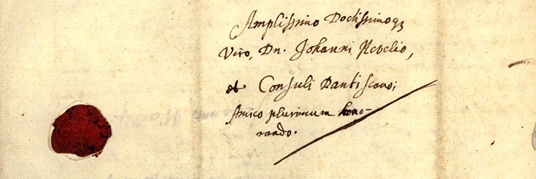Seminar 4: The Materiality of the Letter
Tags: Archives, Britain, Eighteenth Century, Materiality, Seventeenth Century

Detail of letter from John Wallis to Jan Hevelius. Oxford, 26 October 1668 (Waller Collection, Uppsala Universitet, Uppsala; Waller MS gb-01783).
In the fourth installment of the Project’s seminar series on Thursday 20 May, Professor Henry Woudhusyen (University College London) examined the material dimensions of epistolary practice in a fascinating paper entitled ‘Writing a Letter in Early Modern England: Forms and Formats’. Arguing that the ‘social life’ (or ‘cultural biography’) of the letter-as-object has attracted little sustained scholarly attention (a trend reinforced by the tendency of online repositories of letters to efface their material attributes), Woudhuysen used a wide range of examples to explore varieties of and markets for paper and ink; handwriting, superscriptions and addresses, salutations, signatures, and ‘significant space’ (those portions of the page left deliberately black for symbolic or practical reasons); the complex relationship between the formatting of letters and economics, in particular in terms of the strategies employed by letter-writers to maximise available space in order to reduce the cost of postage (such as cross-hatching and the forced invasion of margins); and different styles of folding and sealing, and their associated connotations. Woudhusyen’s contribution was further enriched by a commentary from Dr Peter Beal (School of Advanced Study), formerly of Sotheby’s, and the creator of the Catalogue of English Literary Manuscripts (CELM). In a wide-ranging addendum, Beal discussed (inter alia) the cultural transmission of epistolary styles, casting doubt in particular on the ability of prescriptive letter-writing manuals to shed light on these complex processes; considered the relationship between the formatting of letters and that of the other products of early modern scribal culture (such as petitions); and explored the ways in which letters were stored and filed by their recipients. Seminars take place in the Faculty of History on George Street on Thursdays at 3pm. For future seminars in the series, please see here.
Podcast now available on the seminar page!


 Join
Join 